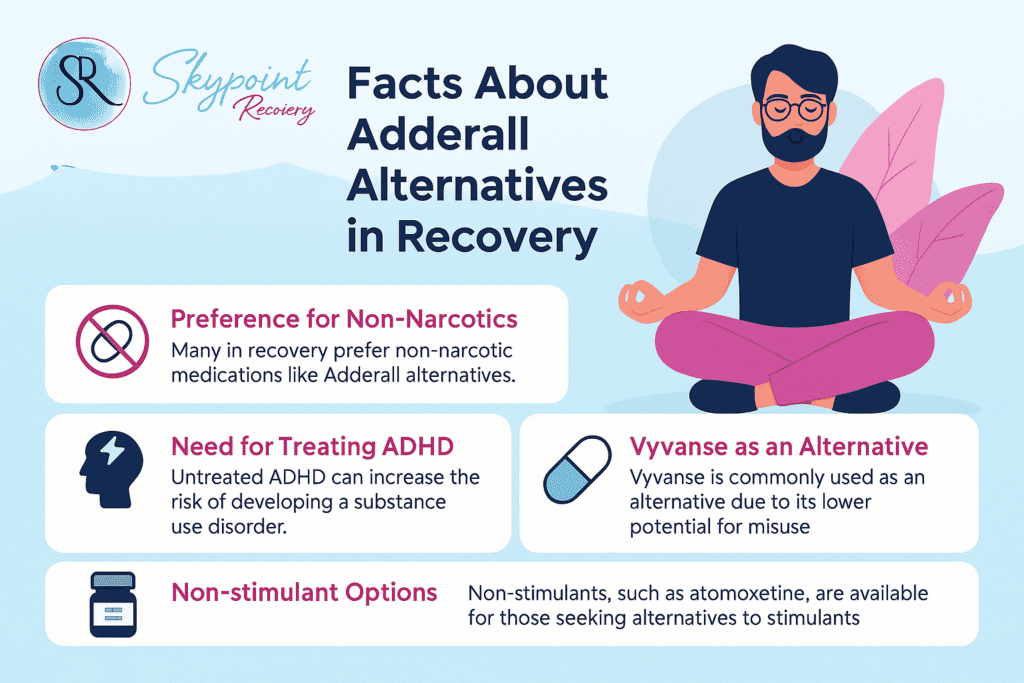Tired of the side effects? Discover safer, effective alternatives to Adderall and take control of your focus and well-being.
If you’re one of the millions of men navigating attention deficit hyperactivity disorder (ADHD), you’ve likely encountered Adderall as a frontline treatment. This stimulant medication is widely prescribed and effective for many. But for individuals in recovery or those with a history of substance misuse, the decision to take a stimulant—especially one classified as a controlled substance—can be complicated. That’s why it’s important to know about Adderall alternatives.
The good news is you have options. Whether you’re concerned about stimulant use, are sensitive to side effects, or simply want to explore non-narcotic alternatives, there are other paths to managing ADHD effectively—without compromising your recovery or mental health.
Understanding Adderall and Its Role in ADHD Treatment
Adderall works by increasing levels of dopamine and norepinephrine, two brain chemicals critical for attention, focus, and impulse control. For many, it significantly improves quality of life. However, because it’s a stimulant and a Schedule II controlled substance, it’s associated with a higher potential for misuse, especially when not used as prescribed.
That said, Adderall can be good when taken under proper medical supervision. It’s a legitimate treatment tool—but it may not be the right fit for everyone, especially those working to maintain sobriety or avoid medications with misuse potential.
Why People in Recovery Seek Adderall Alternatives

Men in recovery often seek ADHD treatments that align with their commitment to sobriety. Common reasons include:
- Preference for non-narcotic medications: Many in recovery avoid controlled substances to maintain a clear boundary between treatment and past substance use.
- Concerns about psychological dependence: Even when taken as prescribed, some individuals worry about relying on a medication for focus and function.
- Triggers and relapse risk: The physiological effects of stimulants can mimic those of previously misused substances, which may serve as a trigger in early recovery.
At the same time, it’s crucial to understand that leaving ADHD untreated can also increase the risk of substance use disorders. Studies show that unmanaged ADHD symptoms—such as impulsivity, restlessness, and difficulty with emotional regulation—can drive individuals to self-medicate with drugs or alcohol. That’s why addressing ADHD is not just beneficial—it’s essential for sustained recovery and long-term mental health.
Natural Alternatives to Support Focus and Attention
Before considering another prescription, you may want to explore natural or lifestyle-based options that can support brain health and reduce symptoms:
Omega-3 Fatty Acid
Found in fatty fish or supplements, omega-3s support cognitive function and reduce inflammation. Some studies suggest that people with ADHD may have lower levels of these essential fats.
Ginkgo Biloba
This herbal supplement is thought to improve blood flow and support brain function. While research specific to ADHD is still emerging, some users report enhanced focus and mental clarity.
Exercise and Diet
Physical activity naturally boosts dopamine, norepinephrine, and serotonin levels—the same chemicals targeted by stimulant medications. Meanwhile, a nutrient-rich diet low in sugar and artificial additives may help stabilize energy and attention throughout the day.
Mindfulness and Meditation
Regular practice improves self-awareness and attention span. Even brief daily sessions have been shown to reduce impulsivity and improve executive functioning over time.
Prescription Alternatives with Lower Misuse Potential
If lifestyle changes aren’t enough, several prescription options may provide relief—some with lower potential for misuse:
Vyvanse (Lisdexamfetamine)
Vyvanse is a stimulant, but it’s designed differently. It’s a prodrug, meaning it becomes active only after being metabolized by the body. This delayed activation reduces its potential for misuse compared to other medications. It also tends to offer a smoother, longer-lasting effect with fewer peaks and crashes. People prefer Vyvanse because of these reasons.
Ritalin (Methylphenidate)
Another stimulant, Ritalin has a slightly different mechanism than Adderall and may be better tolerated by some individuals. Methylphenidate is a Central Nervous System (CNS) stimulant. It works by changing the amounts of certain natural substances in the brain. It’s available in various formulations, offering flexibility in dosing and duration.
Strattera (Atomoxetine)
Strattera is a non-stimulant that targets norepinephrine reuptake. It’s not a controlled substance and may be a strong option for those in recovery or who cannot tolerate stimulants. It typically takes several weeks to reach full effect, so patience is important.
Other Non-Stimulant Options
Certain antidepressants (like Wellbutrin) and blood pressure medications (such as Intuniv or Kapvay) are sometimes prescribed off-label to support attention and focus. These may work well for individuals with co-occurring conditions like anxiety or mood disorders.
The Role of Skypoint Recovery in Supporting Dual Diagnosis
For some men, what began as prescribed use of stimulants has evolved into a pattern of misuse. Others may avoid treatment altogether out of fear that they’ll be pressured to take medications that don’t align with their recovery goals. Skypoint Recovery in Richmond, Virginia is here to bridge that gap.
Our clinical team specializes in treating substance use disorders alongside conditions like ADHD, anxiety, and PTSD. We take a whole-person approach that respects your history, your health, and your goals.
We offer multiple levels of care to meet you where you are:
- Partial Hospitalization Programs (PHP) provide intensive day treatment with the flexibility to return home in the evenings.
- Intensive Outpatient Programs (IOP) offer therapy and support several days per week while maintaining work or school responsibilities.
- Sober Living Residences provide structure, accountability, and a safe environment for men transitioning back to independent life.
Every plan is personalized, and our team works closely with you to find an ADHD treatment that supports both focus and sobriety.
Choosing the Right Path for You
When it comes to ADHD treatment, there’s no one-size-fits-all solution. Here’s how to start:
- Get a professional evaluation: A licensed provider can help confirm whether your symptoms are due to ADHD, anxiety, depression, or a combination.
- Be open about your recovery goals: Your provider can help you find medications—or non-medication options—that align with your lifestyle and values.
- Track your progress: Whether you’re trying a new medication or lifestyle change, document how you feel and discuss it during follow-ups.
- Stay patient: Non-stimulant medications may take longer to show results, but with the right support, they can be highly effective.
A Clearer Future Starts Here
Managing ADHD doesn’t have to mean compromising your recovery. Whether you’re exploring non-stimulant options, looking for a lower-risk medication like Vyvanse, or seeking a holistic recovery plan, help is available.
Skypoint Recovery is committed to helping men find balance between focus, mental health, and lasting sobriety. Let us support you with compassionate care tailored to your journey.
Call 855-612-3488 or fill out our secure form today. Let’s take the next step toward clarity, confidence, and a healthier you.
Related Blogs
-
Endorphins vs Dopamine: How These Chemicals Affect Your Mood and Motivation
-
Understanding Amitriptyline Withdrawal: From Flu-Like Symptoms to Mood Changes
-
M365 White Pill: Prescription Painkiller Benefits and Potential Dangers
-
What Is Flakka and Why is it Called the Zombie Drug?
-
Understanding Ketamine Addiction: Causes, Symptoms, and Effective Treatment Options


Start Your Personalized Recovery Journey Now









